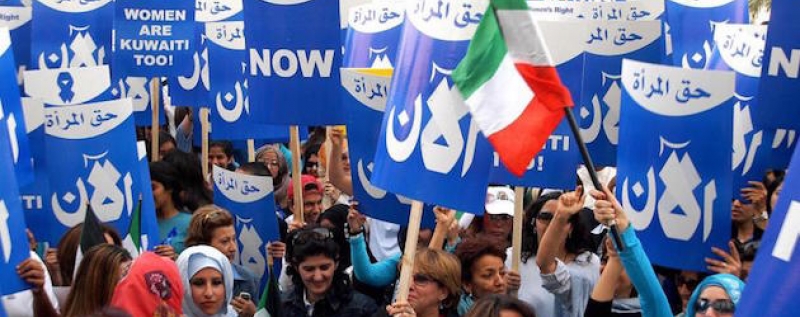Kuwait: Absence of NGOs at review highlights precarious human rights situation
Published on 01 Jul 2016, 01:15 PM
 Kuwaiti women demonstrating in front of Parliament to demand their political rights.
Kuwaiti women demonstrating in front of Parliament to demand their political rights.
The Human Rights Committee reviewed the third periodic report of Kuwait on 21 and 22 June 2016. The main topics of concern were discrimination against women, foreign workers, stateless persons (“Bidoons”) and LGBT persons, as well as freedom of expression and the right to peaceful assembly.
"Different sexual orientations are not a matter of deviant behaviour but a natural condition. Rather than harbouring prejudices, we should analyse the situation objectively, as a social phenomenon"
- (Member of the Human Rights Committee)
Discrimination against women
Committee members noted that in Kuwait, the law provides for women’s rights to work, to participate in public affairs and also to be protected against domestic violence. However, questions were raised on polygamy, the difference in the minimum age for marriage between men and women, as well as the fact that women’s testimonies before a court have less value than men’s. The Kuwait Delegation argued that women’s rights are recognised by the Sharia, as well as polygamy. The Delegation also insisted that the government took measures to protect women and to encourage victims of domestic violence to report abuses, including with the establishment of a community police force which provided social and psychological support for victims of domestic violence
Rights of migrant workers
The Committee recalled concerns formulated during the previous review in 2011on the situation of migrant workers, for whom working conditions could at times be compared to that of trafficked persons. In response, the Kuwait Delegation highlighted measures taken to improve the plight of foreign workers, especially domestic workers. The Committee insisted on the need to undertake independent inspections to protect domestic workers from the abuse of employers. The system of sponsorship could also be a factor of discrimination against migrant workers, the Committee said.
LGBT rights
The Kuwait Delegation and Committee hardly found a common ground on the issue of discrimination based on sexual orientation and gender identity. One member of the delegation went as far as noting that this kind of practice was not acceptable in Kuwaiti society. Among questions raised in that regard, the Committee highlighted the problematic criminalisation of “imitation of the opposite sex”.
NGOs facing threats?
Tensions went a step higher when Committee members inquired about the absence of Kuwait NGOs in the debate, and the information that some NGOs and activists from Kuwait had renounced to participate in the review for fear of reprisals. The Head of the delegation strongly rejected these allegations and claimed that Kuwait is a free country which international human rights NGOs can visit. He questioned the Committee on the sources of such information and enumerated “conferences” which the government had organised in recent months with civil society organisations.
Freedom of expression and assembly
The issues of freedom of expression and the right to peaceful assembly were further discussed. Committee members, quoting NGO reports, questioned the Delegation on the fate of several journalists, Human Rights Defenders and members of the political opposition who were arbitrary arrested and detained. They also drew attention to violations of the right to peaceful assembly, including the obligation to request a licence to organise demonstrations and the prohibition on foreigners’ participation in public protests. The Kuwait Delegation responded that the judiciary is independent and that few individuals had been sentenced for defamation. Kuwait is one of the most progressive countries in the Middle East on freedom of expression, said the Delegation. Arrests and police interventions in “illegal demonstrations” were justified by the need to protect public order and national security.
Death penalty
Finally, the Committee also expressed concern around the issue of the death penalty, including the large number of offences for which it could be imposed. Kuwait recalled that, whilst it maintained an ongoing de facto moratorium, there were no plans to abolish the death penalty.
Recommendations of the Committee
The Concluding Observations for which the State should provide information on the implementation within one year, concern:
- Discrimination against 'Bidoon': The State party should, inter alia: grant citizenship to 'Bidoon' where appropriate; ensure the rights to freedom of movement, peaceful assembly, opinion and expression to 'Bidoon', and equal access to social services; and consider aceding to and implementing the 1954 and 1961 Conventions addressing the rights of Stateless persons.
- Freedom of Expression: The State party should, inter alia: repeal or revise laws containing provisions restricting the right to freedom of expression and opinion in line with the ICCPR; guarantee media freedom and independence from government intervention; release, rehabilitate and provide redress to those who have been imprisoned in contravention of articles 9 and 19 of the Covenant; and ensure that Internet monitoring does not violate the rights to freedom of expression and privacy as defined in the Covenant.
- Freedom of Peaceful Assembly and Excessive Use of Force: The State party should, inter alia, ensure that restrictions on the right to peaceful assembly are in line with the Covenant, and carry out relevant investigations, prosecutions, compensations and trainings with regards to excessive use of force by security officials.
The next (fourth) periodic report of Kuwait should be submitted by 15 July 2020.
Photo credit: http://www.gettyimages.ch/
 Kuwaiti women demonstrating in front of Parliament to demand their political rights.
Kuwaiti women demonstrating in front of Parliament to demand their political rights.

